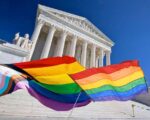>> Two Sisters, Two Views of Gay Marriage
[spacer]
Un an et demi après les disputes publiques d’Elizabeth Cheney et sa sœur homosexuelle Mary, toutes deux filles de l’ancien vice-président américain Dick Cheney, une nouvelle paire de sœurs américaines – et qui s’appellent aussi Elizabeth et Mary… – se trouve au milieu du débat sur le mariage homosexuel.
Elizabeth
« Mary et moi sont proches, même si nous ne nous parlons pas tous les jours.[…] Nous avons toutes les deux des vies occupées et différentes… mais ces différences ont peu d’importance. […]
Néanmoins, il y a une différence d’importance. C’est ma conviction profonde que la complémentarité du genre – l’homme et la femme – et la possibilité de la procréation résultant de cette union ne sont pas accidentelles mais essentielles à l’institution du mariage. […]
Je n’arrive pas à cette croyance parce que je suis “ bigote ” ou parce que j’ai de l’animosité pour les homosexuels et les lesbiennes. […] Mais ni moi, ni les milliards de gens silencieux qui sont d’accord avec moi, nous ne changerons d’opinion. C’est une conviction profonde et bien réfléchie sur la nature du réel, qui ressemble à celle qu’on place dans “ l’égalité dans le mariage ”, une vérité fondamentale et morale.
Quelles conséquences sur mon lien avec Mary ? Devrait-elle me détester pour mes opinions ? Devrais-je la détester parce qu’elle est homosexuelle ? Rien ne pourrait être plus éloigné de la vérité. […]
Voilà le cœur de l’affaire : je n’aime pas ma sœur pour ou contre sa sexualité mais pour l’ensemble de sa personne – l’humour, l’intelligence, la beauté, la gentillesse et la générosité. En un mot, j’aime son caractère.
Mary et moi vivons dans une époque pluraliste où des gens de bonne volonté ont des opinions qui sont radicalement différentes. […] Souvent, aucun camp ne convainc l’autre et les différences perdurent. Si c’est le cas, il faut être civil et tolérant en dépit des différences. Surtout, je crois qu’il faut s’aimer. »
Mary
« J’ai eu une relation conflictuelle avec ma famille pendant une vingtaine d’années. Je n’étais pas exclue complètement, mais je ne me sentais pas vraiment encouragée à “ m’épanouir dans un style de vie homosexuel ” comme ils le disaient. Cet aspect de ma vie était plus ou moins ignoré. Nous nous sommes arrangés pour pouvoir vivre ensemble sans que n’existe ma vie intime ou mes sentiments, en évitant les sujets “pénibles”. Mais tout a changé quand Elizabeth a accouché de sa fille. La famille s’est concentrée sur cette belle nouvelle vie et notre amour pour Anna nous a servi de terrain neutre. […]
Nous avons partagé beaucoup de moments intimes, nous nous sommes ouverts et nous en sommes arrivés à nous aimer et à nous respecter. Mais nous avons des opinions différentes sur le mariage homosexuel.
J’ai une opinion libérale [au sens américain, ndlr] sur le mariage. Je considère que le mariage est par essence une relation entre deux adultes consentants, quel que soit leur genre. A mon avis, refuser aux couples homosexuels et lesbiens le droit de se marier contrevient aux principes fondamentaux d’égalité. […]
Nos opinions sont indépendantes de nos familles et nos amis ; et même si nous voudrions qu’ils soient d’accord avec nous, ils ne le seront pas toujours. […]
C’est de cette manière qu’Elizabeth pense au mariage. Pour une grand part, son opinion est indépendante de moi. Est-ce qu’elle aimerait que je partage sa vision conservatrice du mariage ? Probablement. Est-ce que j’espère que Elizabeth changera d’avis ? Bien sûr. Mais dans le cas où ça n’arrive pas, est-ce que ça va changer notre relation ? Pas du tout. »
[spacer]
>> A pair of siblings on opposite sides of the debate finds that their disagreement does not erase their love for each other.
Elizabeth:
I swore I’d never write publicly about this issue. It always felt too personal. Better to avoid it and focus on what my sister and I have in common.
I had watched, with a sick feeling in my stomach, the public airing of differences between Elizabeth and Mary Cheney in the fall of 2013. Elizabeth, or Liz, is the straight one, Mary, her gay sister. Liz spoke out about her opposition to gay marriage; Mary told her she was “on the wrong side of history.” The two fought publicly.
My sister and I are slightly younger than Elizabeth and Mary Cheney. We too are Elizabeth and Mary. Like Liz, I hold a conservative view about marriage. My sister, by contrast, is gay, and lives with her partner, Becky, in Atlanta.
Mary and Becky are wonderful human beings. They gift art supplies and ballet paraphernalia to my 10-year-old daughter; plastic roaches, whoopee cushions and books of pranks to my 7-year-old son. They feed both children chocolate doughnuts and root beer for breakfast when they’re in charge, and take them on boat trips off the coast of Florida in search of shells. They’re more playful and much funnier than my husband and I.
Most importantly, they make themselves present to my kids with undivided attention. They’re the beloved aunts. My son once told them how neat it is that “their dogs have two moms,” but beyond that neither child has really pressed to know why they’re not married to men, or why they live together in what looks very much like a marriage.
Mary and I are extremely close in the ways that count, even though we don’t talk every day or consider ourselves “best friends.” We both have busy lives, jobs, pets, and travel schedules; and we have many differences too. Twenty years ago these differences divided us; now they no longer do. And yet the differences themselves persist.
Mary is athletic; I’m not. She’s much more libertarian, though socially liberal; I’m more conservative. She has the cool modern furniture; my house is nearly a century old and my decorating style is traditional. But these differences don’t matter much to anyone, including us.
Yet there is one that does. It is my deep conviction that the complementarity of gender—man and woman—and the possibility of new life that may result from their union aren’t accidental but essential to the institution of marriage. Until about fifteen years ago, most people, gay and straight alike, would probably have agreed with me. Today I’m well aware that many no longer do, including my sister.
I don’t come to my understanding of marriage because, as some will undoubtedly assume, because I am a “bigot,” or have animus toward gays and lesbians. I have been reflecting on the issue in a philosophical and historical way for more than a decade now. I know the Supreme Court case law regarding gay and lesbian rights and gay marriage backwards and forwards. I take the arguments for gay marriage very seriously.
And I don’t hold my position in a defensive or angry way either. I’m well aware that the Court is likely to rule in favor of a national right to gay marriage in June of this year. I know I won’t convince many people—or anyone—who isn’t already inclined to agree with me. Yet I can’t abandon my view, nor can the silent millions of people who agree with me. It is a deep and considered conviction about the nature of reality, analogous to the deep conviction that many other people now hold about “marriage equality” as a fundamental moral truth.
So what does this mean for my relationship with Mary? Should she hate me for what I think? Should I in turn hate her because she is gay? Nothing could be further from our minds.
Because here’s the crux of the matter: I love my sister not for (or against) her sexuality, but for her total personality, which includes humor, intelligence, beauty, kindness, and generosity. In a word, I love her character.
Mary and I live in a pluralist age when people of goodwill often hold radically different views.
Mary and I live in a pluralist age when people of goodwill often hold radically different views. This calls, I think, for tolerance of the old-fashioned kind, not persecution of those who differ. It calls for patience and perhaps even persuasion, But the persuasion I have in mind is a humble kind of dialogue that approaches others with dignity and entertains the possibility that they, not I, have a greater purchase on the truth. Often, neither side can be persuaded, and so the differences persist. If this is the case, then tolerance calls for civility despite differences. At root, I believe it calls for love.
If we made our love for family members conditional on their holding the very views we do, then I suspect most of us would be living in dysfunctional families, if in families at all. But in fact millions of people live in ambiguous situations like the one in which Mary and I find ourselves. And I imagine that they, like we, are often reticent to speak out against the extremism in our midst.
When my family was first introduced to Mary’s partner, Becky, at the beach about six years ago, she had obviously been coached by my sister to arrive with gifts in hand—Veuve Cliquot and several good bottles of bourbon. As a family we’ve learned that there’s little that can’t be smoothed over during cocktail hour.
But we didn’t need any liquor to accept Becky. Becky knew how to handle all of us with grace and dignity. She, like Mary, understands our differences. More importantly, she won us over with her warmth, her quiet kindness, and her generous spirit. Even my unflinchingly conservative father recently remarked to me “how good Becky is for Mary.”
She has brought joy not only to my sister, but to us. And yet my views on marriage remain the same, stemming as they do not from particular affections, but from time-honored principles. Happily, what Mary and Becky have shown me is how easy it is to love gay individuals and even gay couples, despite disagreement on the meaning of marriage.
Mary:
Twenty years ago I would have never imagined writing a piece like this. I had just come out to my family, and the news was not met with a great deal of enthusiasm. My sister, Elizabeth, tried to explain to me that my feelings for women did not mean that I was actually gay—just going through a phase. For their part, my parents expressed concern about my mental, spiritual, and physical health and then went mostly silent. I had a conservative upbringing in South Louisiana, where “coming out” was reserved for debutante balls—a tradition in which I did, ironically, also participate.
I had a contentious relationship with my family throughout my twenties. I was never shut out completely, but I was also never made to feel welcome or accepted in “pursuing a gay lifestyle,” as they put it. That aspect of my life was more or less ignored. We had all mastered a dance that allowed us to spend time together while simultaneously avoiding any acknowledgment of my personal life or feelings, and also avoiding any “uncomfortable” topics. But things changed when Elizabeth had her first daughter. Our entire family focused on a beautiful new life, and our shared love for Anna provided neutral ground where we could connect at last.
My role as “Aunt Mary” is something I relish. I currently serve as President of “The Silly Crazy Club,” an association invented by my niece for people who love dogs and love doing crazy things, like scaring people, making silly videos, and dressing up. I myself don’t have children, but I know how important it is for kids to have adults who give them love and unconditional support. Sometimes a child needs things that even parents can’t provide, and Elizabeth knows that I’ll be there for her family. I love her children as I would my own.
Actually, the past 10 years have transformed my relationship with Elizabeth, too.
One afternoon last April, when we were on our way to watch my niece’s ballet rehearsal, Elizabeth, who was then pregnant with her third child, suddenly instructed me to go directly to the hospital. Less than an hour later, I found myself gripping her hand during an unexpectedly natural childbirth. Baby Margaret decided to arrive early, and I literally watched her come into the world. When Elizabeth later experienced some fairly severe post-partum anxiety, she called me for counsel. I told her I would fly cross-country any time she needed me.
We’ve shared many truly intimate and deeply personal moments. We’ve opened up to each other in ways I never imagined possible, and have come to respect and love each other. Yet we have very different views on a variety of topics—most significantly right now, on gay marriage.
Perhaps it won’t be a surprise that I hold a liberal view about marriage. I consider the essence of marriage to be a legally binding, contractual relationship between two consenting adults, regardless of gender. In my view, denying gay and lesbian couples the right to marry goes against the basic principles of equality on which our country was founded. After all, atheists and infertile couples, and divorcees can marry! So arguments grounded in religion and procreation don’t make much sense to me.
When I recently told some friends that Elizabeth and I were considering writing this essay together, many were shocked. Most said that they would have a very hard time dealing with this difference and were curious how we were able to maintain such a positive relationship. Many could not understand why I was not angered or hurt by her position. They saw Elizabeth’s beliefs as an affront to me personally.
In truth, Elizabeth and I had never really discussed our views on marriage—probably because we both knew there were differences and didn’t feel the need to press them. But before I began writing, I felt I really did need to know one thing: would Elizabeth be there if I got married, if it became legal in Georgia? When I finally asked her, I felt as nervous and vulnerable as I did when I first came out. And the stakes were much higher. Now we had a relationship that really mattered to me.
I was relieved to hear that she would support me; but she also disclosed that she would have conflicting feelings about it. What was important to me, though, is that her conflict was not about me as a person, or about my relationship with Becky, but resulted from her understanding of marriage as an institution.
This is where things get tricky. Many people, and even many of my friends, would say that her judgment about marriage is by definition a judgment against me. I can understand this view. I definitely held it fifteen years ago. And sometimes it still feels personal. But I’ve found an analogy for understanding it, even if the analogy isn’t on the same order of importance as marriage.
Ultimately what I care about is not her view on any particular issue—no matter how personal—but the actual content of our relationship.
It is this: Becky and I care passionately about dogs, and have come to see dog rescue as an absolute imperative. Several of our friends, though, don’t see things the way we do. Despite many conversations and attempts at persuasion, they still insist on buying pure-breed dogs. They are doing something that we, on moral grounds, wouldn’t do ourselves. So are we required to hate them, or their dogs? Should we refuse to associate with them, and wish them ill? Of course not. Our views are in a certain sense independent of our friends and family; and while we wish they agreed with us, we accept that they sometimes won’t, no matter what we say to them.
I think this is how Elizabeth feels about marriage: She has a considered view that is largely independent of me. Does she wish I agreed with her traditional view on the issue? Probably, but she knows it isn’t likely. Do I hope that Elizabeth changes her mind someday about gay marriage? Of course. But if she doesn’t, will that change our relationship? Not one bit. When I came out twenty years ago, I wanted to be loved and respected unconditionally. If I’ve learned anything over those years, it is that we have very little control over anything but how we choose to handle our circumstances. We can’t strong-arm or manipulate people into thinking, believing, feeling or doing the same things that we do.
Ultimately what I care about is not her view on any particular issue—no matter how personal—but the actual content of our relationship. Of course being gay is a huge part of who I am, but it’s definitely not all that I am. Most of all, I care about how Elizabeth and I relate to one another. I care that she respects my feelings and my relationship with my partner, Becky. Really, it comes down to something very simple: I choose at once to love my sister and disagree with her on gay marriage.
I know that in this day and age many thousands, if not millions, of families find themselves in predicaments similar to ours. My desire is that our joint disclosure might help others begin to open their hearts and minds to one another. I hope that they can find both the courage and the charity to have those difficult but potentially transformative conversations that they, like we, have avoided for such a long time.
Kim McCabe
à lire sur The Atlantic (en anglais)


















